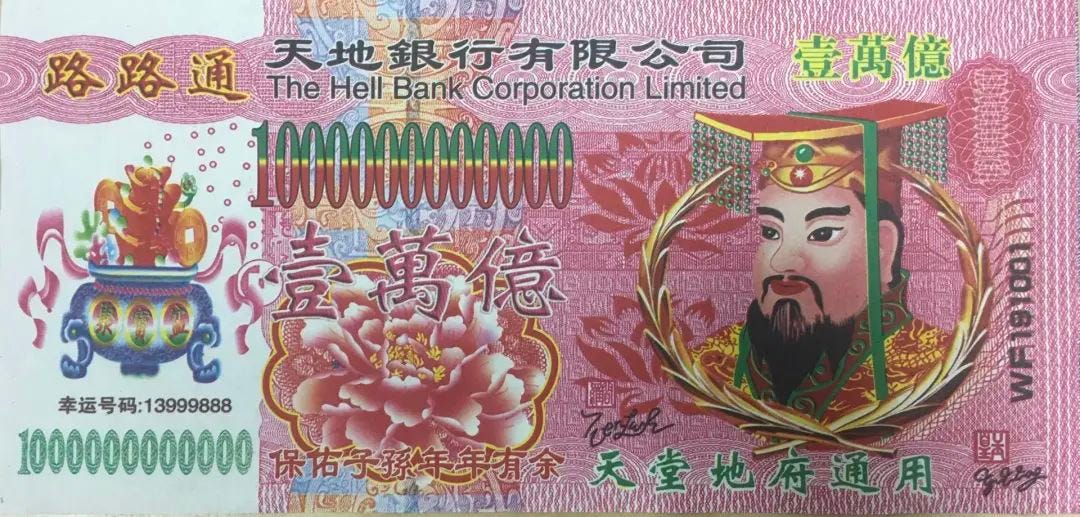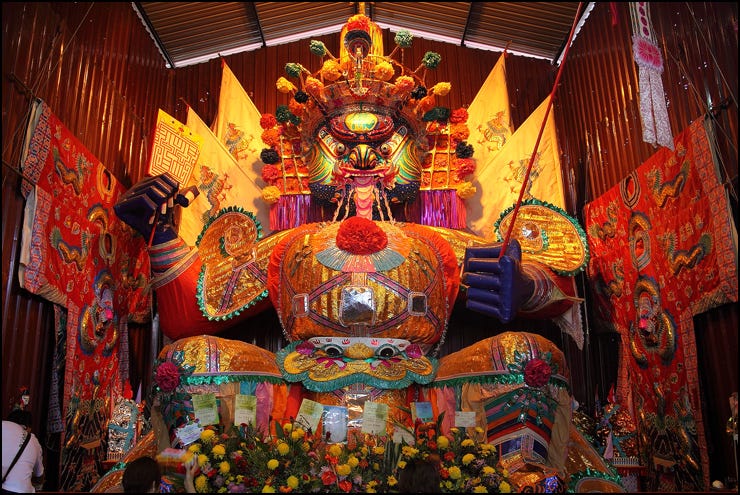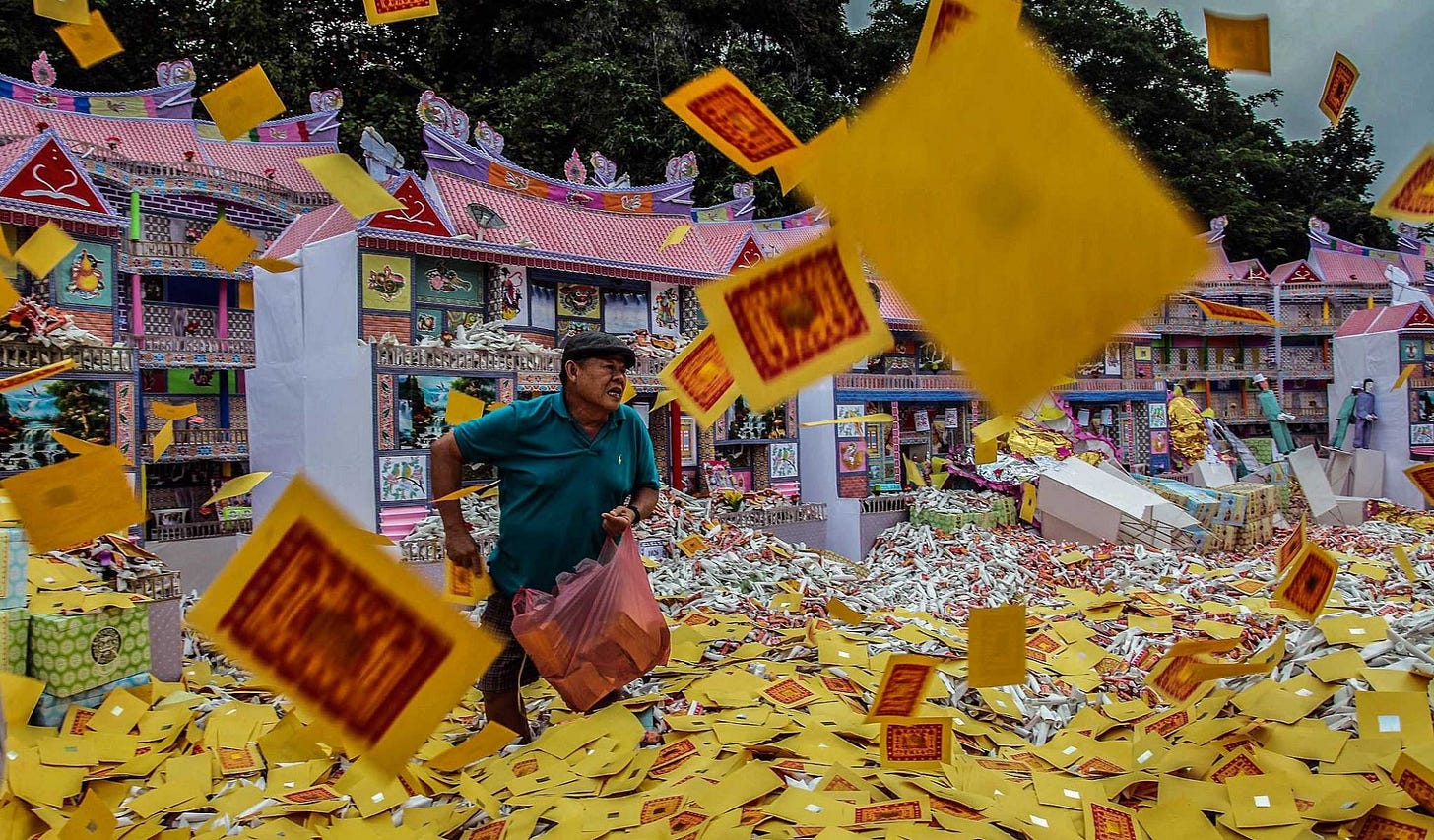The Gates of Hell Are Open! 💀🔥
Let's celebrate Ghost month! 👻
On Monday August 18, the gates to hell were open, and the Zhongyuan Festival (also known as Hungry Ghost Festival) has commenced! It is sometimes referred to as Chinese Halloween 🎃. What is the festival about? Shall we be afraid?
俗话说“七月半,鬼门开”,你知道中元节的由来、传说吗?
As the saying goes, "In the middle of the seventh month, the gates of hell open." Do you know the origins of the Hungry Ghost Festival?
Photo: China Daily
每年的农历七月十五是中元节,今年(2024)则落在8月18日,佛教称为盂兰盆节。与除夕、清明节、重阳节三节同是中国传统的祭祖大节。
俗话, 俗语 (sú huà, sú yǔ): common saying, proverb
农历 (nóng lì): Lunar calendar
盂兰盆节 (Yú lán pén jié): Ghost Festival / Ullambana Festival
除夕 (Chú xī): Chinese New Year's Eve
清明节 (Qīng míng jié): Tomb-Sweeping Day
重阳节 (Chóng yáng jié): Double Ninth Festival
祭祖, 祭祀 (jì zǔ, jì sì): ancestor worship
The 15th day of the seventh lunar month is the Zhongyuan Festival (Ghost Festival), which this year falls on August 18 and is called the Yulan Festival in Buddhism. Along with New Year's Eve, Tomb-Sweeping Festival, and Double Ninth Festival, it is a traditional Chinese festival for ancestor worship.
有句俗语叫 “七有半,鬼乱窜”。人们会在这天烧纸钱、冥币、放河灯、做法事…… 民间还盛行祭祀土地和庄稼。
窜 (cuàn): to flee, to scurry
天烧纸钱 (tiān shāo zhǐ qián): burning spirit money for the deceased
冥币 (míng bì): spirit money
河灯 (hé dēng): floating lanterns
做法事 (zuò fǎ shì): perform religious rituals or ceremonies
盛行 (shèng xíng): to be prevalent
庄稼 (zhuāng jià): crops
There is a saying that goes "ghosts run wild in the middle of the seventh month". People burn paper money, “ghost money”, light river lanterns, and perform rituals on this day. It is also popular among the people to worship the land and crops.
The notes issued by “The Hell Bank Corporation Limited” 😉 is an example of ghost money burnt during the festival. Photo source: thepaper.cn
据说中元之日,地宫打开地狱之门,也是地狱开门之日,众鬼都要离开冥界,接受考校,有主的鬼回家去,没主的就游荡人间,徘徊在各处找东西吃,因此又称鬼节,普遍进行祭祀鬼魂的活动,点荷灯为亡魂照回家之路。道观举行盛大法会祈福吉祥道场,道士建醮祈祷,内容是为亡魂的灵魂超度。
地宫, 冥界 (dì gōng, míng jiè): the underworld
众鬼 (zhòng guǐ): all the ghosts
游荡 (yóu dàng): to wander
徘徊 (pái huái): to linger, to wander
鬼节 (guǐ jié): Ghost Festival
点荷灯 (diǎn hé dēng): to light lotus lanterns
亡魂 (wáng hún): lost souls
道观 (dào guàn): Taoist temple
法会 (fǎ huì): religious ceremony
祈福吉祥道场 (qí fú jí xiáng dào chǎng): A Taoist altar or ceremony for blessings and good fortune
道士 (dào shì): Taoist priest
建醮 (jiàn jiào): to conduct a Taoist ritual
灵魂超度 (líng hún chāo dù): to redeem or liberate souls (from suffering)
It is said that on the day of Zhongyuan, the underground palace opens the gates of hell, and all ghosts have to leave the underworld to be tested. Ghosts with owners go home, while ghosts without owners wander around the human world, looking for food. Therefore, it is also called the Ghost Festival. Activities of worshipping ghosts are carried out, and lotus lanterns are lit to light the way home for the dead souls. Taoist temples hold grand ceremonies to pray for good fortune, and Taoist priests hold rituals to pray for the souls of the dead.
Photo source: legacyoftaste.com
中元节,可以说是佛教、道教与世俗的融合。它的产生可以追溯到古代的时祭,以及与之相关的祖灵崇拜。古时人们对于农事的丰收,常寄托于神灵的庇佑。奉祀先祖在春夏秋冬皆有,但秋其中十分重要。秋天是收获的季节,人们举行向祖先亡灵献祭的仪式,把时令佳品先供神享,然后自己品尝这些劳动的果实,并祈祝来年的好收成。
世俗 (shì sú): secular common customs
追溯 (zhuī sù): to trace back to
时祭 (shí jì): seasonal offerings, seasonal rituals
祖灵崇拜 (zǔ líng chóng bài): ancestral spirit worship
农事 (nóng shì): agricultural work
丰收, 收获 (fēng shōu, shōu huò): harvest
寄托 (jì tuō): to entrust, to place one's hopes or feelings on something
庇佑 (bì yòu): protection, blessing
奉祀 (fèng sì): to offer sacrifices, to worship
先祖 (xiān zǔ): ancestors
献祭 (xiàn jì): to offer sacrifices
时令佳品 (shí lìng jiā pǐn): seasonal delicacies
供神享 (gòng shén xiǎng): offer to the gods
祈祝 (qí zhù): to pray for, to wish
好收成 (hǎo shōu chéng): good harvest
The Ghost Festival can be said to be a fusion of Buddhism, Taoism and local customs. In ancient times, people often relied on the protection of gods for a good harvest. Ancestor worship is done in spring, summer, autumn and winter, but autumn is very important, because it’s the harvest season. People would hold a ceremony to offer sacrifices to the dead ancestors, first offering the seasonal delicacies to the gods, then tasting the fruits of their labor themselves and praying for a good harvest in the coming year.
Photo source: Tatler
而在这一天,据说有很多禁忌之事,比如:
1、不能披头散发睡觉。
2、不能说“鬼”字。
3、不能半夜庆生。
4、不能乱拍他人的肩膀。
5、不能半夜晾衣服。
披头散发 (pī tóu sàn fā): Hair down and loose
庆生 (qìng shēng): Celebrate a birthday
乱拍 (luàn pāi): randomly tap
肩膀 (jiān bǎng): Shoulder
晾衣服 (liàng yī fú): hang clothes to dry
On this day, there are said to be many taboos, such as:
1. Do not sleep with your hair disheveled.
2. Do not say the word "ghost".
3. Do not celebrate birthdays in the middle of the night.
4. Do not pat others on the shoulders.
5. Do not hang clothes in the middle of the night.
Are you afraid of ghosts? Don’t do the above, or you will attract them! ༼ つ ◕_◕ ༽つ
Antoine & Dorota









